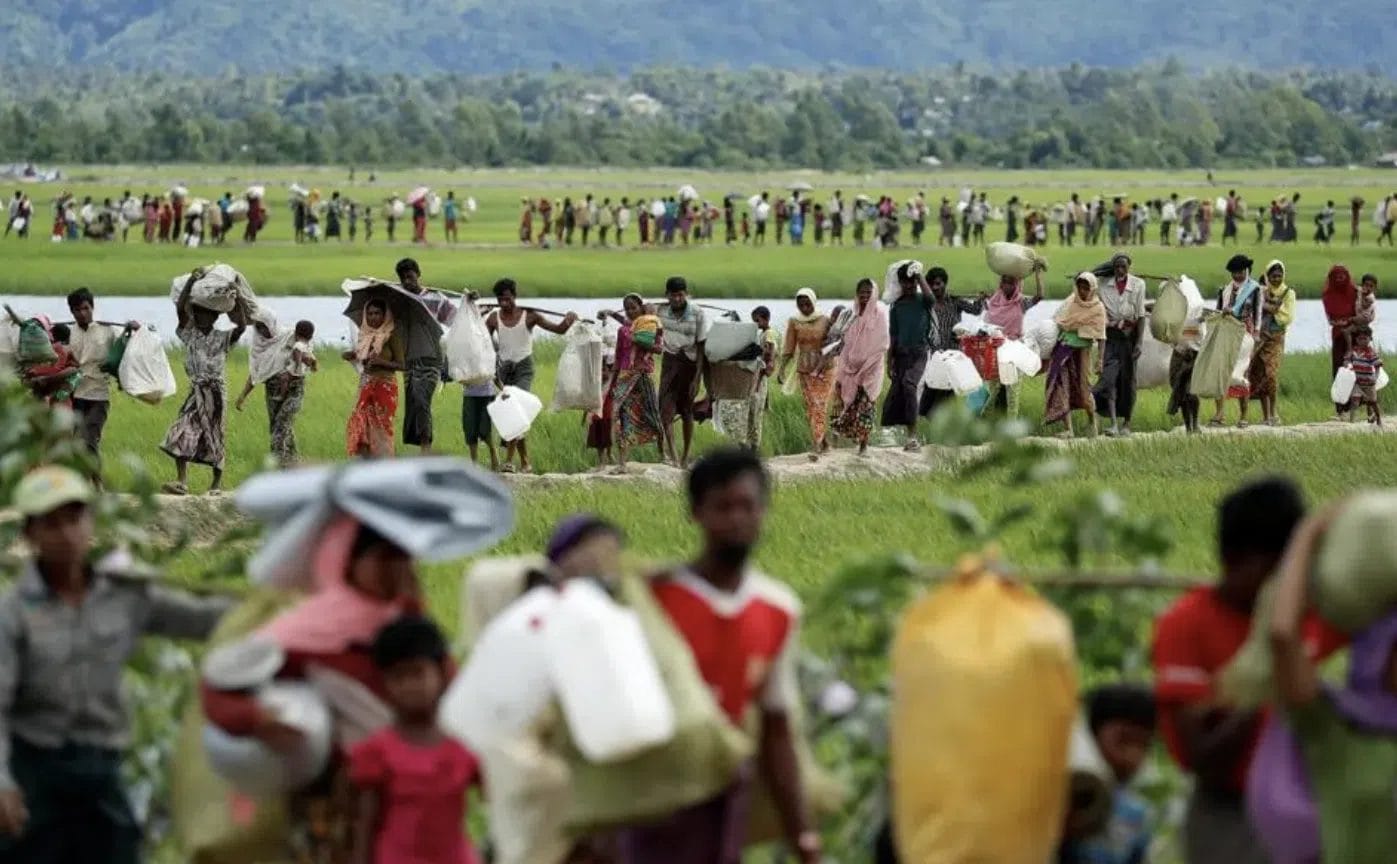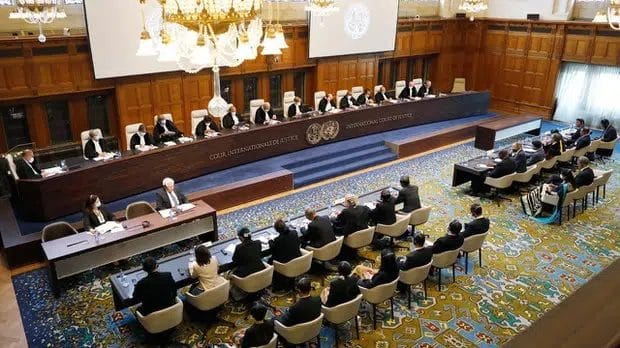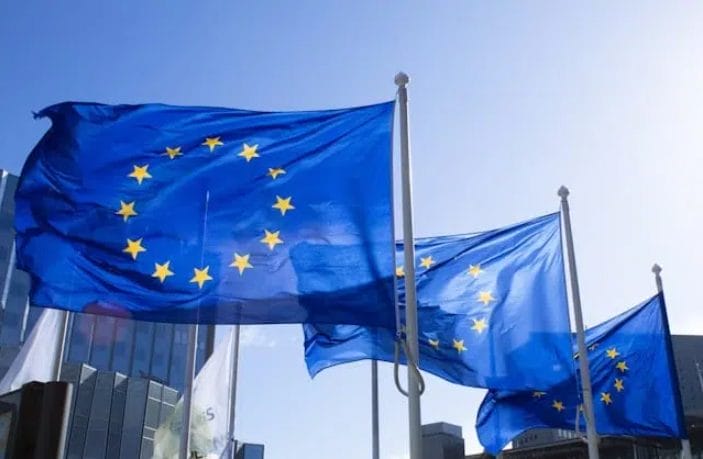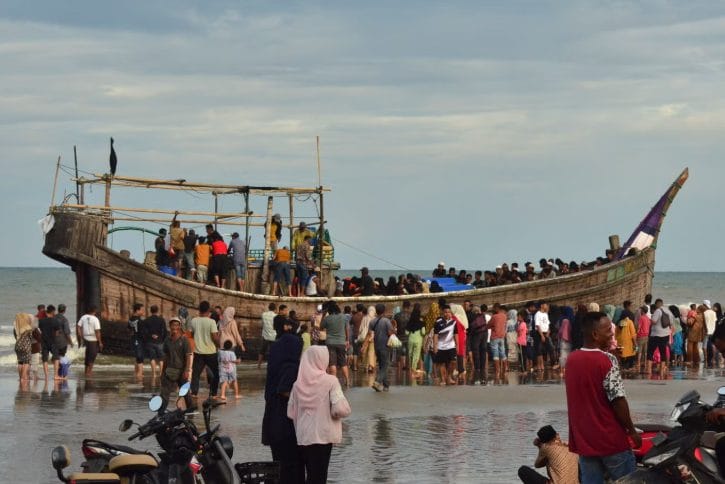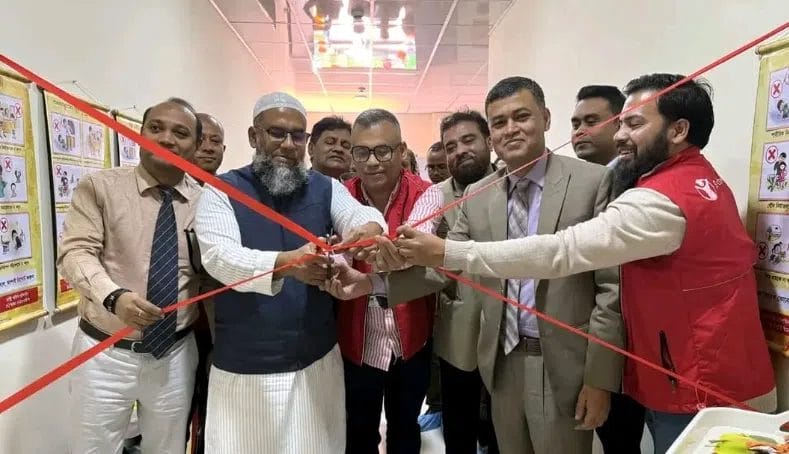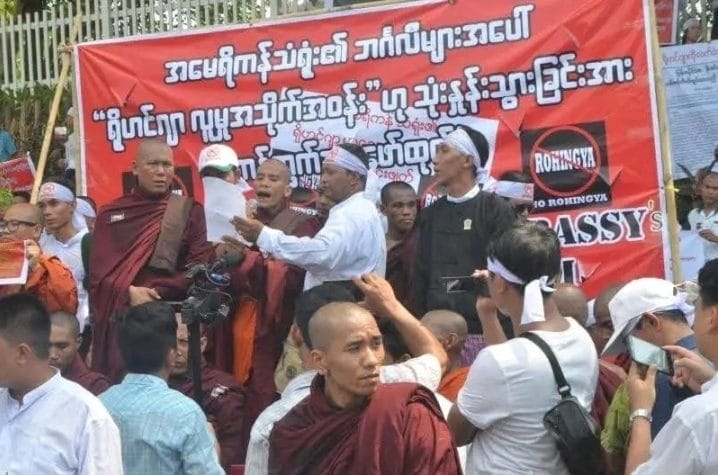Arakan News Agency | Exclusive
Eight years have passed since the military campaign launched by the Myanmar army against the Rohingya in Arakan State in western Myanmar in 2017, which was described as a genocide. As the eighth anniversary of the August 25 massacre arrives, the Rohingya face the looming threat of a new massacre at the hands of another party in the conflict, while justice and accountability remain absent.
Year after year, the anniversary comes, and the memories of atrocities and massacres do not fade from the minds of survivors who barely escaped with their lives. The pain follows them as if they witnessed it yesterday, while hopes for justice and accountability against the perpetrators of the “genocide” drift further away. The genocide included various forms of individual and collective violations, forcing nearly 700,000 Rohingya to flee to Bangladesh, bringing their number there today to more than 1.1 million refugees.
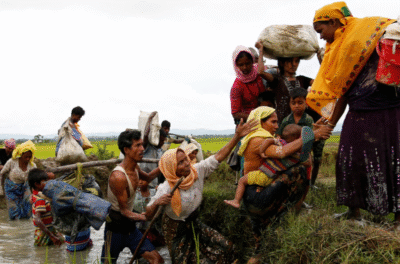
During the massacre, thousands of Rohingya were killed, villages and homes were burned, people were forcibly displaced, women were subjected to mass sexual assaults, and people were burned alive. Those fleeing across the border were targeted with bombs, landmines, and airstrikes. The Rohingya fled to Bangladesh thinking it was temporary, believing justice would be achieved and that they would return home soon. But nothing of that sort has happened.
Prosecution
The first attempts to prosecute and hold accountable the perpetrators of the genocide against the Rohingya began two years after the massacre, when The Gambia filed a lawsuit against Myanmar at the International Court of Justice (ICJ) in 2019, backed by 57 member states of the Organization of Islamic Cooperation, accusing Myanmar of violating the UN Convention on the Prevention of Genocide.
Despite Myanmar’s objections, the Court on January 23, 2020, issued orders for provisional measures to protect the Rohingya and preserve evidence. In July 2023, the Court rejected Myanmar’s jurisdictional objections and declared the case admissible. Later, nine countries joined the case, including Ireland, Canada, the United Kingdom, Denmark, France, Germany, and the Netherlands.
Last year, although the case had not yet resulted in holding any perpetrators accountable, hopes were renewed in November when the Prosecutor of the International Criminal Court (ICC), Karim Khan, requested an arrest warrant for Myanmar’s military commander, General Min Aung Hlaing, as the top official responsible for the genocide.

The Prosecutor’s investigation concluded that Min Aung Hlaing bears full criminal responsibility for committing crimes against humanity in Myanmar, carried out by the armed forces with the support of police units, border guards, and non-Rohingya civilians. This was based on a wide range of evidence, including live testimonies, documentary evidence, and verified video footage.
Despite the broad optimism and welcome of the arrest request, justice and accountability have yet to take their first steps.
A New Genocide
The Rohingya’s suffering did not end with the 2017 events. Waves of displacement have continued with the rise of the Arakan Army (a Buddhist militia with separatist goals) since 2023. The militia faces international accusations of committing serious violations against the Rohingya requiring international accountability.
Among the most notable incidents attributed to the Buddhist Arakan militias was the killing of about 200 Rohingya fleeing the fighting towards the Bangladesh border, targeted with artillery and drones in August 2024, causing many deaths, including women and children.

Earlier this month, skulls and bones said to belong to more than 600 Rohingya were discovered. They were allegedly killed by the Buddhist Arakan militias, some of whom were burned alive during attacks on the city of Buthidaung last year, according to survivor testimonies and human rights groups.
The Rohingya living under the Arakan militias endure miserable conditions that drive many to flee daily to Bangladesh, where the number of refugees has exceeded one million. The militias have also been implicated in coordinating with human trafficking networks, extorting money from the Rohingya in exchange for allowing them to leave.
In a recent report, Human Rights Watch accused the militias of committing grave abuses against the Rohingya in Arakan, including discrimination, looting, arbitrary arrests, forced recruitment and labor, and oppressive policies similar to those long imposed on them by the Myanmar military.
According to live testimonies provided by survivors to Fortify Rights, the Buddhist Arakan militias committed widespread abuses against the Rohingya in the state, including detention, torture, killings, and beheadings over the past two years. The organization’s investigation confirmed that the militias committed serious violations of the laws of war against the Rohingya in detention centers. Fortify Rights called on the ICC to investigate the war crimes committed against Rohingya civilians.
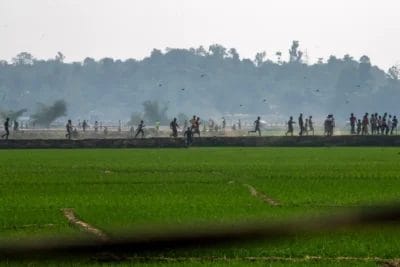
In the same context, numerous Rohingya rights groups urged the international community to designate the militias as a terrorist organization due to their systematic violations aimed at terrorizing, persecuting, and displacing the Rohingya.
Looking Ahead
While justice remains elusive, the Rohingya are pinning hopes on the upcoming United Nations conference scheduled for September 30 in New York, expected to address solutions to the crisis, ensure their return to their homeland, and strengthen international support.
With accountability still absent, repatriation plans remain mere ink on paper, especially amid insecurity and the lack of sufficient guarantees for their safety, while the remaining Rohingya in Arakan State continue to suffer persecution at the hands of the armed Buddhist Arakan militias controlling most of the state.
Several attempts have been made to announce repatriation plans, the most recent in April when Myanmar declared 180,000 Rohingya refugees as “eligible to return.” However, these plans have stumbled over Myanmar’s lack of effective control over the state, the absence of practical plans or concrete steps, and the Rohingya’s own fears that repatriation would be another trap.
Caught between past betrayal and uncertain promises, the Rohingya keep their eyes fixed on the future, hoping that the coming months or years will bring them either a safe homeland or justice and accountability for their persecutors—allowing them to leave the past behind and build a clear future for themselves and their children.

